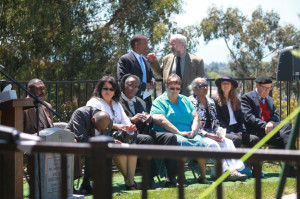
Ron Haulman: First of all, I want to thank everyone for coming out to Evergreen Cemetery for such an important occasion. Just by way of introduction, my name is Ron Haulman, and I’m the executive director of Evergreen Cemetery, and it was my pleasure to do all of this for all of you.
Applause
Ron Haulman: I’m going to be very brief, because in reality, this day is not about me. This is about all of you. This is the day that you’ve been waiting for for 32 years, and so I’m going to let you all get on with your day, so that you can have the day for yourself and as a group. But I do want to give one piece of recognition especially to the honorable ambassador of Guyana, Bayney Karran, who has come here today to join us in this very important event. Thank you, Mr. Ambassador.
Applause
Ron Haulman: And now I’m going to turn this podium over to John Cobb. Mr. John Cobb.
Applause
John Cobb: Well, hello, everyone. And I’d like to thank everyone for being here today. This has been a long time coming, and this is truly a happy day. We’re going to start here by bringing up Mac [Fielding M. McGehee III] and Susan [Ashby] and Herb [Newell], and you’ll come up and do the unveiling of the plaques and placing of the wreaths. O’Malley [Jones], would you please come up as well? I think he’s going to have a piece for us here while we do the unveiling and placement of the wreaths, and it’s over to you.
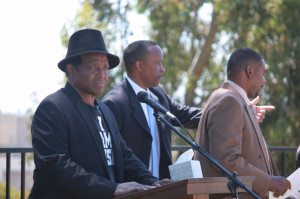
O’Malley Jones: (sings)
I once went far away from God
And now I’m coming home.
But I’ve wasted many precious years.
And now I’m coming home.
Yeah, coming home.
Whoa, coming home.
Never more to roam
Oh, open wide thy arms of love
And now I’m coming home.
Applause.
John Moore: Creator of all, whose breath gives life to all, we are grateful for the treasures which have come to us in earthen vessels, toddlers and boys and girls, and mothers and fathers, and husbands and wives, and adults in the prime of life, and old men and old women. Bless the hundreds who rest here and the hundreds more who rest elsewhere and their kin who still hurt. We dedicate these markers which transforms from a mass of a thousand into individual human beings who worked and played, who knew joy as well as woe, who lived and died. Bless this place, and bless all of us, as we comfort and give strength to each other, and to any who need us. Bless us with renewal of our commitment to do justice and love kindness. Amen.
Applause
John Cobb: I didn’t get a chance to introduce him, but that was the Reverend John Moore. Thank you again. Can we give him another hand?
Applause
John Cobb: He has been involved in this from day one, so he has been waiting for this moment for quite some time, and we thank him for being able to make it.
Before we go any further, there are just a couple of people that I have to just mention real briefly, and they both didn’t want to be mentioned, but I have to say something about Jim Jones Jr. He was part of the JT– Jonestown Memorial Fund – I’m sure everyone has heard of what that is – and that was just three of us collaborating to start this process and to get it done, along with the help from so many other people, but he was tireless in his efforts and there at every turn. We talked about this several years ago, and I said, “James, how long would it– how long do you think this would take, or how much,” and he said, “I don’t know,” and about October last year, he called me and said, “Hey, Johnny, you know, I found out.” And I quickly said, let’s make it happen,” and it’s helped us get to here.
And of course, the third person was Fielding McGehee.
Applause
John Cobb: I’m sure everyone has probably heard of Fielding and talked to him or of course been in touch with him through email. He is tireless. Throughout working with this over the past several months, we pretty much either talked or emailed several times during the course of the day, and Mac is tireless. I remember one time he emailed me, it was like 6:30 in the morning. And I emailed him right back with my Blackberry, and he emailed me right back and said, I’m surprised you’re up this morning, and I said, well, Mac, you know I like to kind of start my day off in the gym, you know, around 5:30. Of course, the very next day, I had an email at 5:15 before I left for the gym. But that’s Mac. Becky, does he ever sleep?
Rebecca Moore: Yeah.
John Cobb: Okay. But thank you both. This truly could not have happened with you– without you. And thank you.
Moving right along, we’re going to have some guest speakers. And the guest speakers – I don’t know if you know everyone – but we tried to select people who were former members and people that could touch on just about every generation and every age group and reflect on their feelings, and we’re all anxiously awaiting to see what they have to say. First speaker will be James Cobb.
Applause
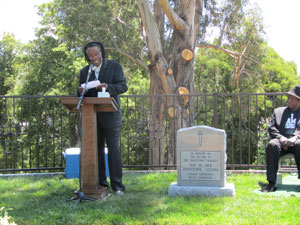 James Cobb: (Adjusts mike) He helped me lower it a little bit. My glasses don’t go that far. (Waves pages) I’ll hold it close.
James Cobb: (Adjusts mike) He helped me lower it a little bit. My glasses don’t go that far. (Waves pages) I’ll hold it close.
Kasserian Ingera. How are the children? More on this later.
First, I would like to thank my brother John Cobb, James Jones Jr., and Fielding McGehee for organizing this memorial dedication ceremony, for their initiative and follow through. I would like to thank all of you in attendance for being here, for your support and for the support of those elsewhere whose contributions made this memorial possible. I also would like to thank Mr. Buck Kamphausen and Mr. Ron Haulman and the entire Evergreen staff for their generous contributions and for the hard work which turned a quiet slope into this wonderful memorial.
I am grateful for this occasion, finally, after far too long.
I’ve been to the site many times in the last three decades. My visits have always been a private affair. This recent transformation – this beautiful memorial with the granite tablets and all the names of those lost in Jonestown – has made the invisible visible. It is simple and elegant, and I anticipate individuals and families will find occasion to visit much more often.
Hopefully many first-time conversations about some aspect of Jonestown and the loved ones lost there will take place at this site; in fact, it has already happened with my son Joel and I a week ago. My brother Joel – my son’s namesake – died in Jonestown at age 13, and is buried here. My son and I talked as we transferred his uncle’s name from the granite slab onto paper by rubbing over it with a pencil.
This day means so much to so many, some no longer with us in body. Taking the liberty I’d like to mention two, Beverly and Howard Oliver. I met Howard and Beverly days before November 18 nearly 33 years ago. I admired them for their bravery and being loving parents.
The night of November 17th, as we talked in small groups after visiting Jonestown earlier, Beverly had finally gotten to see and be with her sons. She said with pride and tears, “Those are my boys.” I don’t have heroes, but there are many whom I admire and who inspire me. Two that go back over 40 years are Fannie Lou Hammer and Harry Belafonte. Beverly and Howard Oliver are special as well.
The story of those who died, our story, was written in bold headlines nationwide only a few days after the 18th of November, three decades ago. Most of the headlines read “Bizarre Suicide Cult.” What hit the front pages of the newspapers first, especially with such authority of voice, was repeated over and over and over again and was, by and large, accepted by the general public as official truth.
The names chiseled in this granite memorial will be touched and read by many people. Some will come specifically to see it, others visiting other gravesites will wander over and read the names of Bill and Bruce Oliver, Brian and Claudia Bouquet, Joel Cobb, Steve Addison, Edith and Dan Kutulas, Mona Young, Leo Ryan…
That story will be more complete when those involved, as members, friends, relatives and others in knowing positions, tell their stories.
As introduced, my name is James Cobb. I lost my mother, brother, three sisters, other relatives and many friends in Jonestown. I was there in Guyana during those terrible hours. Our loss was more than losing mothers, brothers, sisters, wives and friends in an untimely manner. It was also about losing a dream.
I first walked through the door of Peoples Temple, wide-eyed and holding my mother’s hand, as it began in Indianapolis, Indiana in the 1950s. I was awed by the interior size of the place, the sea of people standing against the walls, in the aisles, and crowded outside the front door.
On Sundays, my sisters Ava and Teresa and I, squeaky clean and Vaseline shiny, tagged along with our mother to this church. It was there where, for the first time, I saw people of all colors worshipping together. Over the years the crowd grew smaller, and a little darker, but feeding the hungry and homeless continued. That’s where I headed every time I attended, to see for myself, that this church was doing this not just on holidays and special occasions. This impressed me.
At age 5, my dream was to become a professional baseball player. By age 10 or 11, my mission in life was set: in addition to a Hall of Fame baseball career, I would devote myself to helping the world be a better place. Like most if not all of you, I had seen enough injustice, poverty included.
A lofty dream perhaps, envisioning the United States of America’s people united, no more poverty, no more racism, no more war. And, in the mix, our seniors, protected, cared for and treated as kings and queens. After a lifetime of work, making and building this country, they have earned and deserve peace of body and mind. No worries about healthcare or money, no worries about being respected or not properly cared for. Silly and grandiose, perhaps, but for me, this has been a just cause to wake up to each morning believing that one day this vision would become the reality it should be.
I joined Peoples Temple when I was 17 years old, leaving my native Indiana to follow my parents, sisters and brothers in California after they had relocated there months earlier to become a part of what I had come to understand to be a people’s movement for justice and equality. In those early days, Peoples Temple presented an exhilarating example and potential of what people – black, white, red, yellow, older and young, from different religions and walks of life – could accomplish together to help this country live up to its promise of liberty and justice for all.
Our children are the future. Yet, one-third of those who died in Jonestown were children under the age of 17. So, I greet you again as I greeted you in the beginning, with the expression Kasserian Ingera. It is a greeting passed between Masai warriors as explained in Dr. Joy DeGruy’s book, Post Traumatic Slave Syndrome. It means, “and how are the children?” Continuing, she includes an excerpt from a speech by the Rev. Dr. Patrick T. O’Neill:
Even warriors with no children of their own would always give the traditional answer. “All the children are well.” Meaning, of course, that peace and safety prevail, that the priorities of protecting the young, the powerless are in place, the Masai society has not forgotten its reason for being, its proper functions and responsibility. “All the children are well,” means that life is good.
I wonder how it might affect our consciousness of our own children’s welfare if, in our culture, we took to greeting each other with the same daily question: “And how are the children?” I wonder if we heard that question and passed it along to each other a dozen times a day, if it would begin to make a difference in the reality of how children are thought of or cared for in this country. I wonder if we could truly say without hesitation, “The children are well, yes, all the children are well.”
In the long days, weeks, and months after Jonestown, each of us – attempting to overcome our isolation and shock – took our own nightmarish journey back to some kind of normalcy, each of us trying to reconnect the pieces of our shattered lives. Varying degrees of loss, grief, rage, despair and guilt has marked these journeys. Many of us found comfort in alcohol and drugs to numb ourselves against our ever-present mental and emotional pain.
But ultimately, life’s energy will not be denied.
Some of us didn’t make it through, but for most of us – many of whom are seated here now listening to these words – we have finally succeeded in healing ourselves to the point where we can come to fully remember and memorialize those we loved and lost.
Our successful journeys can be directly attributed to the continuing love and support of new loved ones and the regrowth of family. It was my remaining and growing family who sit with me in this audience today: my brother John, my sister Teresa, my sons James and Joel, my nieces Raphael and Monace, and nephew William, my beautifully intelligent grandchildren Janae and the one bouncing in front, Laila – whose presence, love and encouragement have helped me, gradually, to regain my strength and will to keep living.
So, for me, this monument is much more than an object created to commemorate the loved ones lost. It is the place to slow down, meditate, peacefully contemplate, and heal. It stands as a reminder to me of the dreams, dedication, hard work, and commitment needed to achieve the realization of a vision against forces which will always be there to try and stop us. I look out at the young ones in my family, and I hope they are beginning to understand that Jonestown was about much more than one thousand people who senselessly died. I hope they understand that – in its highest sense – it was about people working towards a dream of peace, justice, and equality for all people. And, it is my hope that this remembrance of these loved ones will strengthen you in your resolve to – each in your own way – continue to strive to make our world a place were their dreams and visions can still come true.
Thank you.
John Cobb: Well, thank you, James, for those words. We will move right along, and our next guest speaker will be Juanell Smart.
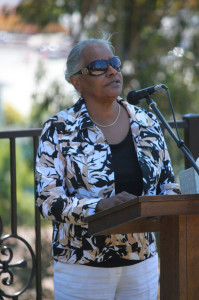 Juanell Smart: Thirty-two years, six months, one week and five days ago, none of us thought we would be here to dedicate four memorial plaques to over 900 people, family, friends, children, loved ones. Nor did 11,881 days ago did my four children – Tinetra Fain, Al Smart, Scott Smart, Teri Smart – my mother Kay Nelson and my uncle Jim McElvane know that we would be here dedicating four memorial stones. To them, I say that I’m sorry it took so long. This should have happened a long time ago.
Juanell Smart: Thirty-two years, six months, one week and five days ago, none of us thought we would be here to dedicate four memorial plaques to over 900 people, family, friends, children, loved ones. Nor did 11,881 days ago did my four children – Tinetra Fain, Al Smart, Scott Smart, Teri Smart – my mother Kay Nelson and my uncle Jim McElvane know that we would be here dedicating four memorial stones. To them, I say that I’m sorry it took so long. This should have happened a long time ago.
I find it difficult to speak at any length about my family, especially my children, but I’d kind of like to say something about some of the other children that were in the LA Temple. I often think about little Gary Tyler. He really wasn’t little, but he was a teenager in the LA Temple, and very quiet, very shy, but extremely smart and very dedicated. There was Darrell Devers who I secretly had hoped would be my son-in-law one day, not that I was unhappy with the choice my daughter made with Poncho. Poncho had a beautiful voice. The day I was over there, I went over with my two– three younger children, and of course, I think we all know the talent shows that Jonestown is famous for, and Peoples Temple, and Poncho sang “The Greatest Love,” and there were so many years after that I could not listen to that song, until one day, I accidentally heard the last few lines, that said, “And if by chance that special place that you’ve been dreaming of, leads you to a lonely place, find your strength and love.” And I hope that they did.
I didn’t realize that Poncho had living family until today, and his brother is here, and I was so happy to meet him.
I don’t know how many of you knew the Baisy children – there were a lot of them – but they were so well behaved and they used to kind of look like little ducklings following behind their mother. And there was Angela Connessero. Little baby, beautiful little baby, and I used to sit and hold her and rock her to sleep.
We knew these children. (Pause) They were no different than other children. They had the same dreams, the same hopes, the same problems, but they had one thread running through them that was consistent, and that was, they all wanted a better world for everyone. And they were steadfast in that desire, some even moreso than their adult counterparts.
There are a number of children buried here who have been– who were not identified. Among them are Teri and Scottie, my two youngest. Now with these four markers and all the names, they are not any longer unidentified or unclaimed. We know that they’re here, they’re named, and after all these years, I realized there was something I needed to do, wanted to do, and didn’t know what it was. I want us to say goodbye. And now I can. Bye Mom. Bye Uncle Jim. And bye my beautiful children. Thank you.
Applause.
John Cobb: Thank you, Juanell. We appreciate that so much.
The next person we have coming to speak is Leslie Wilson.
Leslie Wilson: Oh my gosh, this is what happens when love prevails. My name is Leslie Wagner Wilson, I was one of the escapees of Jonestown, Guyana of November 18, 1978. I am so grateful to be here today. I never thought I would see this happen. And I want to give– really give thanks to Mr. Buck [Kamphausen] and Mr. Haulman and the staff at Evergreen Cemetery for giving a resting place to our families when no other cemetery in the United States wanted their bodies. I thank you for that.
Applause
Leslie Wilson: I know that God placed the hearts of three men maybe a whisper – Fielding McGehee from the Jonestown Institute, who I also call Mac, and most of us do, and also my gatekeeper to my two brothers, Jimmy Jones Jr. and Johnny Cobb. And even though you still tower before me, you’re still my little brothers – for a thought, an idea, a possibility, and with that, a call to action to where over – I’m sorry – 120 people, families and friends, listened to the call and also saw the possibility. And this is what happens when people of one accord come together, and love prevails.
When I came back 32 years ago, my heart felt like it had been shattered into a million shards of glass. I was like Humpty Dumpty fell off the wall and would never be put back together again. Here lies 13– I’m sorry, I lost a total of 13 family members, eleven which lay to rest here and a host of friends that I had known since the age of 13. The first emotions I felt were blame and anger, suicide thoughts and I just didn’t see how my life was ever going to be fulfilled without– with anything more than just a pain of agony of waking up every day. And through the years, what happened was I had two additional beautiful children who are here – Monique Inez, Demetrius – my grandson Junior, another granddaughter and continued a– a bloodline that shouldn’t have been continued by man’s standards. And with that love for them came an overpowering feeling of forgiveness, because without forgiveness, we cannot heal.
Applause
Leslie Wilson: And with forgiveness comes love. It goes hand in hand. And so when I realized that now my life had taken a different course, I became a different person. The last two weeks have been enormously emotional, more than I thought, I just didn’t expect it. And what I attributed to that was the fact that I never saw– I never thought I would see this. And then I started thinking about how families of soldiers that are missing in action want their remains back, so they can have closure. And so now, that’s what we have. And I started– just knowing that they were here, I started thinking about my childhood memories, like Sandy Cobb and I purposely working the three-to-eleven shift at the Pierre Chevy Ukiah during the summer so we wouldn’t have to go to Wednesday night meetings–
Laughter
Leslie Wilson: –to our bus trips across country where, I tell you, those of us in the church, we could sleep and dress anywhere.
Applause
Leslie Wilson: –to Jim Cobb, who I thought of as my big brother and used to refer to him as Black Jesus, and he tried to teach me how to play the trumpet; to the perfect smiles of Brenda, Sandy and Joel Cobb; to the rambunctious spirit and light of Eleanor Beam; to Melanie Breidenbach who was so crazy about Joe [Wilson]; and to my sister Michelle, who was just, you know, the rebel of the family, of her beauty and spirit; to my brother Mark who I was so glad at the age of 16 found– did find love; to my nephew Deron, my niece Dawnyelle; to my mom who I was so blessed to be able to see her the morning of November 18, to be able to feel her lips touching my cheek, her arms around me, not knowing that that would be the last time I saw her, and to hear her words, “I love you.”
What we have here is not just a memorial wall, it’s a healing wall. And now we can run our names– our hands across their names engraved in this beautiful stone as they are forever engraved in our hearts. Now we can continue to live their love and not their deaths. Thank you.
Applause
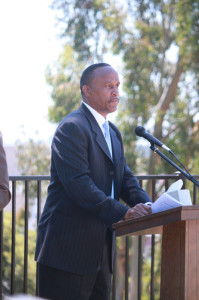
John Cobb: Thank you, Leslie, for those words. It’s still hard to remember, she used to babysit me.
Laughter
John Cobb: So I wasn’t going to cry, but I’m starting, I’m starting. Thank you.
Laughter
John Cobb: Next we have Rebecca Moore coming to speak, Fielding McGehee’s wife, and Rebecca is uh– well, I’ll let you tell it. Okay? Thank you so much.
Rebecca Moore: Thank you very much, and I really appreciate the honor to speak on this very important occasion. I just have a few words to say, and– and when you go last, everyone else has pretty much said it all.
First, a word of appreciation, certainly to Evergreen Cemetery for accepting the unidentified and unclaimed victims of Jonestown 32 years ago when it was a very unpopular thing to do.
We certainly appreciate the work of the Jonestown Memorial Fund, James Jones Junior, John Cobb, and my husband, Fielding McGehee, of whom I’m very proud.
I also appreciate the singing of O’Malley Jones, and just really appreciate your being here.
Applause
Rebecca Moore: I also want to say that I do appreciate the faithfulness of Jynona Norwood, who steadfastly has conducted memorial services on this hillside every November 18, year in and year out.
Second, I want to speak a word of recollection. I think of the many people, living and dead, who would like to have joined us at this memorial. Dr. Chris Hatcher, Michael Bellefountaine, Ezra Schacht and my mother Barbara Moore are particularly in mind. I received an email from someone in Indiana who wrote that he was too sick and too poor to come out. Let’s take a moment of silence to remember those who cannot be with us on this historic occasion.
(Silence) (Mike malfunction) (Silence)
Okay. I declare the moment of silence over.
Laughter
Rebecca Moore: Third, a word of perspective. We do not come here to separate the just from unjust, the worthy from the unworthy. We leave judgment to the wisdom of God and the mercy of Allah. We leave judgment to the law of karma and the compassion of the Buddha. We leave judgment to the writers of history. That history is being inscribed this very day as we gather to remember and mourn. We probably don’t agree on much outside the gates of Evergreen Cemetery, but we are united in our common loss at this site and at this time.
Fourth, a word of liberation, which several have already spoken. Today we are able to set aside our anger and hate, our guilt and shame, our fear and anguish. Freed of these burdens, we are able to move forward to do the work that needs to be done.
Finally, a word of remembrance. The remains of my two sisters Carolyn and Annie are buried in another cemetery. The remains of my nephew Kimo are buried here. Today they are united in this memorial.
But we know that our loved ones are not there, on a monument, or not on thie hillside. They’re– They’re here, in our hearts. They’re part of who we are, and who we always will be. But when we are gone, in ten, or twenty, or fifty years, this tribute will remain to remind the world of that fateful day and the people who lived and died in Jonestown.
Let this memorial to our losses remind us that we can be better people than we are, and that we must be.
Thank you.
Applause
John Cobb: Okay. Next we’re going to have Charles Krause come up, and he’ll be introducing our next guest speaker.
Introduction by Charles Krause
Charles Krause: I’m very pleased to be here today. I’m Charles Krause. I was with the Washington Post. I was a reporter who accompanied Congressman Ryan into Jonestown and was one of those who was wounded on the airstrip when he was killed, and these whole various tragedies sort of began to unfold that day. I’m here, and I want to thank the organizers of the memorial service for inviting me and for inviting Ambassador Karran, Guyana’s ambassador to the United States. I know that he is here to express on a kind of mission of peace and reconciliation, because there are many of us, many different parties, who were part of this whole tragedy, and it’s important, because many people in the United States only have one image of Guyana, and they associate Guyana with Jonestown, and they really don’t know much about the country or the people there. And it’s important that Guyana too put the past to rest, and for all of us to go forward, remembering what happened, because there are important lessons for all of us, but moving forward. And I think that’s the spirit that is being expressed here today, and that’s how I feel personally, and I know that’s how Ambassador Karran feels as well. He is one of Guyana’s most distinguished diplomats, he is both ambassador to the United States as well as the ambassador to the Organization of American States. He represents Guyana in a number of international institutions that are working with the country to improve its economy and to see progress in Guyana. So it’s in that spirit of reconciliation that Ambassador Karran is here today, and I hope you’ll welcome him and hear what he has to say.
Address by Ambassador Bayney Karran
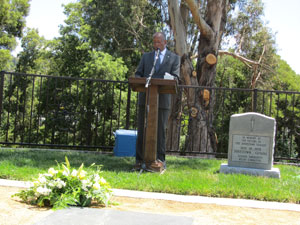 Ambassador Karran: Ladies and gentlemen. I wish to express my appreciation to Mr. Fielding McGehee and his fellow organizers for their kind invitation to make a few remarks at this Jonestown Memorial Dedication Service. I also wish to specially thank Charles Krause, a miraculous survivor, for his warm introduction and for forging the connections which have enabled my attendance here today.
Ambassador Karran: Ladies and gentlemen. I wish to express my appreciation to Mr. Fielding McGehee and his fellow organizers for their kind invitation to make a few remarks at this Jonestown Memorial Dedication Service. I also wish to specially thank Charles Krause, a miraculous survivor, for his warm introduction and for forging the connections which have enabled my attendance here today.
The world has come to regard the Jonestown events as a catastrophe so unconscionable that it has defaced humanity. Today you are memorializing those who have been laid to rest. But they were hardly the only ones to have been affected by the occurrences at the Jonestown commune, the Port Kaituma airstrip and at Lamaha Gardens in Georgetown. Trauma, emotional suffering and stigmatisms have also been visited upon the innocent survivors of the tragedy and family members of the victims. Indeed, the Jonestown event continues to captivate the imagination of the world and perpetuate a blemish on the images of both the United States and Guyana. Fortunately, in spite of the disturbing nature of the occurrences, they have failed to adversely affect the friendly relations which have always existed between the people of Guyana and the people of the United States.
Americans often ask me where was I and what was I doing at that time. On the day following the disaster, I showed up for work at the radio station in Georgetown. Part of my job was to read the news, and I was among the first persons to deliver information about the events to the Guyanese public. Guyana, as you know, is a relatively young country, having celebrated our of Independence anniversary just last Thursday. In 1978, there was no television service, and the public information system was under a restrictive regime of state control.
Unbeknown to me, the news items which had been prepared for broadcast had been devised to conceal the enormity of the tragedy from the Guyanese public. Being none the wiser, I was really misleading radio listeners by vastly understating the actual number of victims of the tragedy. Obscuring the true facts from the Guyanese public was facilitated by the remote location of the Jonestown commune from any populated areas.
However, this sham was quickly exposed. Overseas telephone calls were informing people about the reports from the international media. The authorities in Georgetown were then obliged to release more accurate information to the population bit by bit.
To the people of Guyana, those sad occurrences were totally alien to them and completely divorced from their reality. In fact, the average citizen had had no idea that such a place like Jonestown existed in their own country. The Guyanese people viewed the incident principally as a humanitarian calamity. After the shocking truth had been exposed, a sentiment of great anguish at the loss of so many lives, and feelings of sympathy for the victims, swept over the nation. I have come here today to reiterate those condolences. I join you in the expectation that the Memorial which you are dedicating today would provide a measure of closure and catharsis for those who continue to be victimized as well as to help erase the undeserved stigma which many of you, just like the people of Guyana, have endured these past 33 years.
The events occurred at a time when the prevailing international realities, in tandem with the local conditions created by a dictatorial political system, provided a context for the Peoples Temple Agricultural Project to organize and operate within our borders with impunity. Guyanese vividly recall that period as a difficult time in our history. It was a season when the results of national elections were falsified, human rights were trampled and demonstrations in favour of political freedoms were quelled by violence. Although it has never been claimed that any Guyanese citizen participated in the Jonestown events, either as perpetrator or as victim, it is beyond dispute that the country’s political leadership at the time was compromised and there was an absence of appropriate security guarantees.
While monuments, memorials and mere words would never assuage the depth of hurt and grief, it is worth mentioning that our two countries have both learnt their lessons. Today, such a disaster would be much more easily prevented. But more importantly, Guyana is now a different country. Guyanese have now broken the shackles of political oppression and have developed a forward-looking and modern society. Today, our nation is recognized for its bold and innovative strategies for growth and development within a stable and democratic framework. The survivors who are here today have borne witness to the country’s breathtaking natural beauty, its abundant resources and the unparalleled reputation of its people for warmth, generosity and genuine hospitality to all those who visit lour shores. It was chosen over other locations because the Peoples Temple believed that Guyana offered its members a safe and peaceful place to live.
Just as you are doing here today, Guyana is turning new pages on this dark chapter in our past and is rising to face new heights. Even as we bow– as we all bow once more today in remembrance of the victims of the tragedy.
I thank you.
Applause
John Cobb: I’d like to thank you again, Mr. Ambassador. We appreciate you taking out the time to come here. He actually lives back east in DC, and so this was a trip for him, and we really appreciate him making this trip.
Applause
John Cobb: I would also like to thank all of our speakers. We really appreciated your words, and they meant so much, I’m sure, to everyone.
Applause
(The open mike portion of the service continues here.)